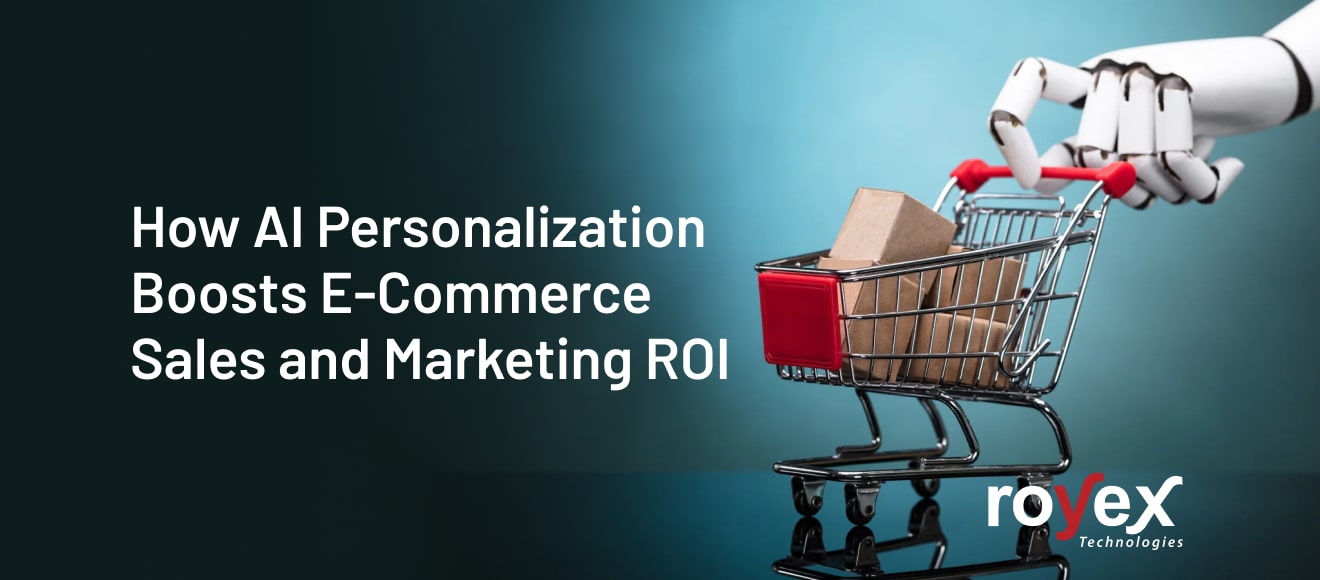
How AI Personalization Boosts E-Commerce Sales and Marketing ROI
E-commerce is growing faster than ever, with millions of businesses competing for customer attention. To stand out and succeed, online stores must do more than offer great products—they must deliver personalized shopping experiences that feel tailor-made for each customer. This is where artificial intelligence (AI) comes in.
AI personalization is changing the way e-commerce businesses operate, helping them increase sales and achieve a better return on investment (ROI) for their marketing efforts. Let’s explore how AI personalization works and why it’s a game-changer for e-commerce.
What is AI Personalization?
AI personalization involves using artificial intelligence to create unique shopping experiences for individual customers. By analyzing customer data—such as browsing behavior, purchase history, and preferences—AI tools can recommend products, customize marketing messages, and optimize the entire shopping journey.
This approach ensures that every customer feels like the brand understands their needs, leading to higher engagement and better sales results.
Why Does Personalization Matter in E-Commerce?

In the digital age, customers expect personalized experiences. A generic “one-size-fits-all” approach no longer works. Here’s why personalization is crucial for e-commerce:
-
Better Customer Engagement: Personalized content grabs attention and keeps customers interested. When shoppers see products or deals that align with their preferences, they’re more likely to stay on your website and explore further.
-
Higher Conversion Rates: Tailored recommendations make it easier for customers to find what they need, reducing decision fatigue and encouraging faster purchases.
-
Improved Customer Loyalty: Customers are more likely to return to a brand that remembers their preferences and offers relevant suggestions. This builds trust and long-term loyalty.
-
Increased Marketing ROI: Personalized marketing campaigns are more effective because they target the right audience with the right message, reducing wasted ad spend.
How AI Personalization Boosts Sales
AI helps e-commerce businesses in many ways. Here are some key benefits:
Product Recommendations
AI studies customer behavior, such as browsing history and past purchases. It then suggests products that customers are most likely to buy. For example, Amazon’s “Customers Who Bought This Item Also Bought” section is powered by AI.
Dynamic Pricing
AI can adjust prices based on demand, competition, or customer behavior. For example, if a product is popular during the holiday season, AI might suggest slight price increases to boost profits. Similarly, discounts can be offered to customers who are hesitant to buy.
Targeted Marketing Campaigns
AI analyzes customer data to send personalized emails, messages, or ads. Instead of sending the same promotion to everyone, it tailors offers to suit individual customers. For instance, if you’ve been searching for shoes, AI can send you a discount code for footwear.
Improved Search Results
When customers search for products on an e-commerce site, AI ensures they find the most relevant items. It predicts what they’re looking for, even if the search term isn’t accurate.
Cart Abandonment Recovery
AI tracks customers who add items to their cart but don’t complete the purchase. It sends reminders, personalized emails, or offers discounts to encourage them to finish their purchase.
How AI Personalization Increases Marketing ROI

Marketing ROI measures how much profit you earn from your marketing efforts. AI helps improve ROI by:
Targeted Email Campaigns: AI helps segment customers based on their preferences and behavior, allowing businesses to send personalized emails. For example, a clothing brand can send emails showcasing summer outfits to customers who previously purchased swimwear.
Predictive Analytics: AI uses past data to predict future customer behavior. This allows businesses to run campaigns at the right time, such as promoting winter coats just as the weather starts to get colder.
Optimized Ad Campaigns: AI identifies which products or messages resonate most with specific customer segments, helping businesses create highly targeted ad campaigns. This reduces ad spend while maximizing returns.
Real-Time Marketing: AI enables real-time marketing by delivering personalized offers or messages while customers are actively browsing a website. For example, a pop-up offering a discount on a product they’re viewing can encourage immediate purchases.
Real-Life Example
-
Amazon: Amazon is a leader in AI personalization, using algorithms to recommend products based on customer browsing and purchase history. Its “Customers who bought this also bought” feature drives significant additional sales.
-
Netflix: While not a traditional e-commerce platform, Netflix’s recommendation engine is a great example of AI personalization. By suggesting shows and movies based on viewing history, it keeps users engaged and subscribed.
-
Sephora: Sephora uses AI-powered chatbots and virtual assistants to provide personalized beauty product recommendations, helping customers make confident purchasing decisions.
How Can You Get Started with AI Personalization?
If you’re an e-commerce business owner, here’s how you can use AI personalization:
-
Collect Data: Use tools to gather customer data, such as purchase history, browsing habits, and preferences.
-
Invest in AI Tools: Platforms like Shopify, Magento, or custom AI solutions can integrate AI into your website.
-
Focus on the Customer Journey: Use AI to improve every step of the shopping experience, from search to checkout.
-
Test and Improve: Regularly analyze AI performance and make adjustments to improve personalization.
Conclusion
AI personalization is transforming e-commerce by offering tailored shopping experiences. It boosts sales, improves customer loyalty, and increases marketing ROI. In today’s competitive market, adopting AI is not just a choice – it’s a necessity.
The e-commerce industry demands fast, reliable, and personalized customer service to stay competitive. Eyaana’s customer service ai helps e-commerce businesses manage high volumes of inquiries, streamline order tracking, and handle returns and refunds effortlessly. With features like omnichannel communication, automated responses, and intelligent ticketing, Eyaana ensures prompt assistance, reduces cart abandonment, and improves customer satisfaction. By automating follow-ups and providing real-time updates, Eyaana helps e-commerce businesses drive conversions, enhance customer engagement, and reduce operational costs—all while delivering a seamless shopping experience.





